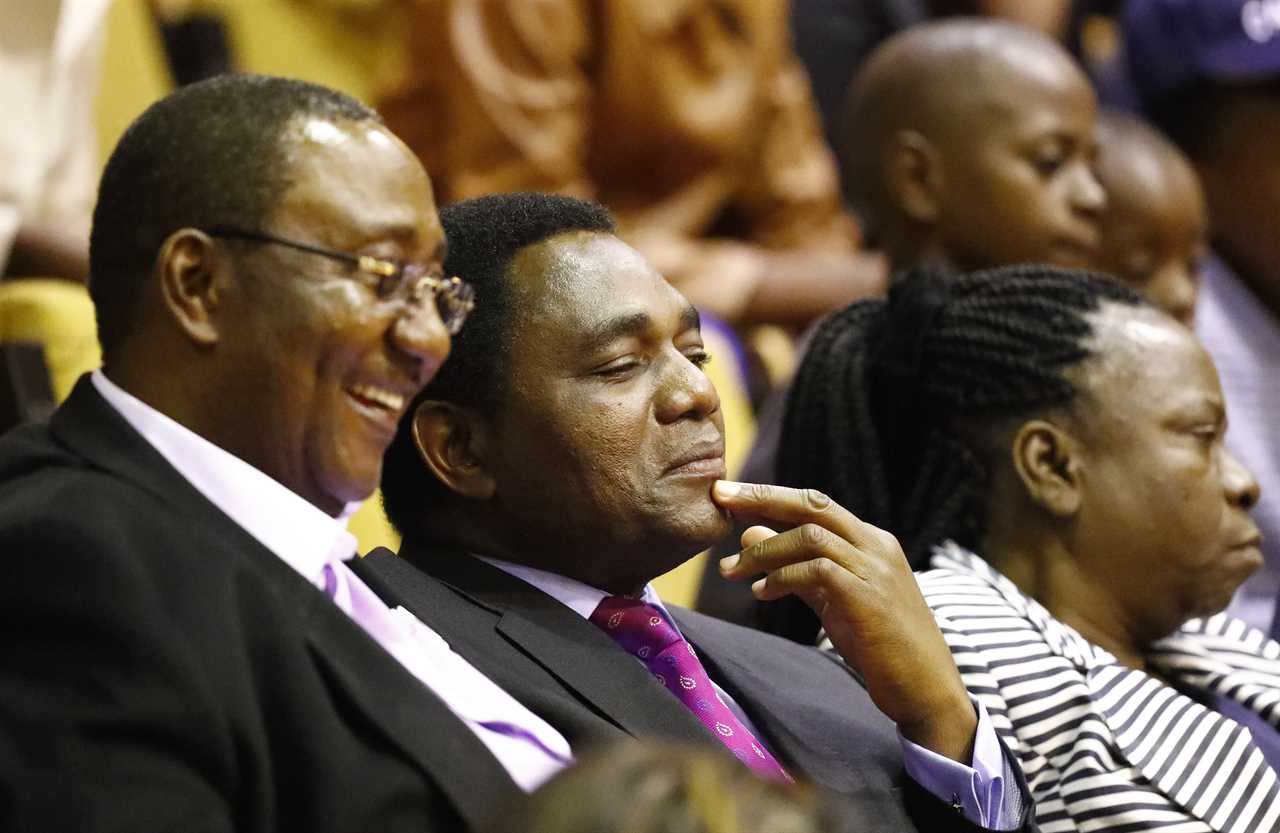
Hakainde Hichilema (C), leader of the Zambia opposition party United Party for National Development. EPA-EFE/NIC BOTHMAAs Zambia prepares to go to the general polls on August 12th, it does so in a context of political decay. It’s also in the midst of a serious economic crisis and the unfolding COVID-19 pandemic.
Tensions have escalated for months. In addition to forceful police conduct, and the prevention of the opposition to campaign, supporters of the ruling party Patriotic Front and the opposition United Party for National Development have fought each other. Recently, two Patriotic Front cadres were killed in clashes with the opposition in Lusaka. Violence has also occurred between factions within the political parties.
What is at stake in Zambia’s poll and why are the elections so volatile?
The last elections in 2016 were characterised by growing mistrust and a drift towards political violence. The 2016 election was a tight race between the incumbent Edgar Lungu and opposition leader Hakainde Hichilema. Allegations of election fraud followed. And intolerance with the opposition manifested in the imprisonment of the opposition leader Hichilema over treason for almost four months.
A dismal picture
The final report of the Commission of Inquiry into the election-related violence is a depressing read.
Based on witness testimonies, it tells the story of attacks against people, death, harassment, property destruction, displacement and pervasive hate speech. The commission was appointed by the president, but he’s not acted on its important recommendations. These include depoliticising the police, restoring trust in electoral management bodies and ensuring space for independent media.
This election features the two same players and a highly polarised electorate. Frustration is growing among the opposition supporters who deem the last election as stolen.
Since 2016, the situation is further aggravated by the concentration of political power in the hands of President Edgar Lungu. His grip on power has increased and the quality of democracy has declined.
Zambia was historically a politically stable country, despite failure to fully consolidate democracy after the peaceful transition to multiparty politics in 1991. But Zambia is now labelled as an “electoral autocracy”. It’s even been listed among the world’s top 10 countries that are turning into autocracies.
The human rights situation has also deteriorated. Violations of human rights –- such as police brutality and unlawful crackdowns on dissent -– have frequently occurred during the last five years.
The Public Order Act, a legacy from colonial times, has been misused to severely restrict the rights of individuals and organisations to protest or organise political rallies. A legislated pretext to apply force to break up peaceful assemblies.
The election also takes place in a context where discontent with President Lungu and the ruling Patriotic Front party has grown. When incumbents, such as Lungu, fear electoral defeat, the risk of violence generally rises.
Politics of fear
Survey data by Afrobarometer, the independent African survey group, indicates a decline in support for the ruling party. Recent polls in Zambia placed the incumbent as victor. But these polls were questioned on grounds of their credibility.
Another sign of popular discontent is that violence has been playing out in traditional strongholds of the ruling party. Urban areas are common sites of resistance, but resistance has also happened in rural areas where the ruling party dominates. For instance, in Mpulungu in the Northern Province.
On August 1st, in an unprecedented move, President Lungu deployed the army onto the streets to safeguard the election and restore order. This signals the breakdown of the rule of law. In addition, the legitimacy and capacity of the police has been severely undermined.
But Zambia also follows a pervasive securitisation of elections. Rulers rely on a discourse of politics of fear to justify coercive interventions. Similar securitisation closely accompany elections elsewhere on the continent.
Reports of violence have circulated for some time. Even if tensions have escalated, they largely remain isolated incidents. Regardless of the scale of the violence, and who may be behind it, the discourse is one of politics of fear. Thus, there are suspicions that the army will be used to intimidate opposition voters and depress turnout. Not to ensure electoral security.
Looking to the future
What is worrisome is that even if Zambians desire political change, research indicates that fear of facing electoral violence lowers support for democracy.
Another key concern is that the capacity and legitimacy of critical conflict-mitigating institutions – such as civil society organisations and the judiciary – have gradually eroded. At critical junctures in Zambia’s political history, formal and informal institutions played an important role in reducing tensions and solving political disputes. For instance, during the transition to multiparty elections in 1991, and an unconstitutional presidential third term bid in 2001 by second president Frederick Chiluba.
The shrinking democratic space, and deteriorating political situation, have reduced the opportunities for constructive intervention. It has also limited the ability of civil society actors and the judiciary to act independently in election-related disputes.
Regardless of who wins the election, key priorities for the country involve combating the economic crisis and the consequences of the COVID-19 pandemic. Another critical challenge that lies ahead will be to move away from the politics of fear that permeate the elections. The government must restore citizen trust in the tarnished institutions that for long have kept Zambia at peace.

The Swedish Research Council (grant 348-2013-5408 and 2016-05833) and Riksbankens Jubileumsfond (grant P16-0124:1) funded this research.
The Swedish Research Council (grant 348-2013-5408 and 2016-05833) and Riksbankens Jubileumsfond (grant P16-0124:1) funded this research.
-------------------------------
By: Johan Brosché, Associate Professor, Department of Peace and Conflict Research, Uppsala University
Title: Zambians go to elections amid turmoil. What’s at stake
Sourced From: theconversation.com/zambians-go-to-elections-amid-turmoil-whats-at-stake-165776
Published Date: Mon, 09 Aug 2021 15:04:09 +0000
Read More
Did you miss our previous article...
https://badpoliticians.com/world-politics/budget-2021-the-liberals-massive-historic-very-costly-bet-on-childcare
 UK PoliticsWorld PoliticsVideosPrivacy PolicyTerms And Conditions
UK PoliticsWorld PoliticsVideosPrivacy PolicyTerms And Conditions
